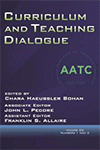
Curriculum and Teaching Dialogue
Vol. 22 # 1 & 2
Edited by:
Chara Haeussler Bohan, Georgia State University
John L. Pecore, University of West Florida
Franklin S. Allaire, University of Houston-Downtown
A volume in the series: Curriculum & Teaching Dialogue. Editor(s): Chara Haeussler Bohan, Georgia State University. John L. Pecore, University of West Florida. Franklin S. Allaire, University of Houston-Downtown.
Published 2020
Curriculum and Teaching Dialogue is a peer-reviewed journal sponsored by the American Association for Teaching and Curriculum. The purpose of the journal is to promote the scholarly study of teaching and curriculum. The aim is to provide readers with knowledge and strategies of teaching and curriculum that can be used in educational settings. The journal is published annually in two volumes and includes traditional research papers, conceptual essays, as well as research outtakes and book reviews. Publication in CTD is always free to authors.
CONTENTS
Acknowledgments. 2019 KEYNOTE ADDRESSES. Presidential Address—Curriculum, Community, and Justice: Challenging the Role of Education in the Quest for Social, Justice Joseph Flynn. AATC Keynote Address—The Marcella Kysilka Lecture: Schoolhouse Activists: Disrupting Narratives About African American Educators’ Involvement in the Alabama Civil Rights Movement, Tondra L. Loder-Jackson. AATC Keynote Address—The Trouble With Social Justice Education: Teacher Identity, Orthodoxy, and Activism in Distressed Times, Leslie David Burns. VOLUME 22, NUMBER 1. Editorial Remarks: Curriculum Concerns in Times of Crisis, Chara Haeussler Bohan. “A Rose by Any Other Name”: The Significance of Naming in Face-to-Face, Online, and Hybrid Teaching, Crystal D. Howell. The Dialogic Dilemma: Pacing Guides as Objects of Analysis, Jennifer Broome. How Subject Leader Collaborations Across Schools Can Act as a Source of Personal and Curriculum Development, Carla Solvason and Alison Kington. A Student’s Approach to Constructivist Curriculum Design, April A. Valdez and Kristina Reed. Criticality and the Narrative Inquiry Table: Travel Stories and Tensions, Stephanie Behm Cross, Susan O. Cannon, Morgin Jones Williams, Jessica J. Hale, Martha K. Donovan, Clarice O. Thomas, Maima Chea Simmons, and C. Aiden Downey. Educators as Political Activists: The Oklahoma Teacher Walkout, Jessica Watts. Theater Devising as Teaching Strategy for the Non-Theater Classroom, Grant Goble. VOLUME 22, NUMBER 2. Editorial Remarks: Teaching Mindfulness for Pandemic Times, John L. Pecore. Waking Ecological Mindedness Through Artifacts and Stories, Mary M. Jacobs, Christy McConnell, and P. Bruce Uhrmacher. Are Schools “Robbing” Students? Resuscitating the Purpose of School Through CPR, Nathan Anderson, Daniel R. Conn, Michelle Tenam-Zemach, Ian Clemente, Luke Schaefer, and Joel Zemach. Indigenous Epistemologies: Implementing Indigenous Practices and Perceptions to the Area of STEM, Michelle Garcia-Olp, Chris Nelson, Angel Hinzo, and David Atekpatzin Young. Embodying and Enacting the Grand Narrative to Disrupt Power, Privilege, and (Monocultural) Perspectives, Holley Roberts. The Role of Student Mentors in Teacher Program Induction, Leslie S. Keiler, Raffaella Diotti, and Kara Hudon. Preservice Teacher Training for Service-Learning Experiences as AVID Tutors, Laura VanDemark and Dana L. Haraway. A Cycle of Fragility: Prospective Teachers’ Emotions and Perspectives Around Being Assessed and Evaluated, Elizabeth Hope Dorman. OUTTAKES. What Really Goes On: Surprises in a Study of Graduate Student Experiences, Lucy Bailey. Thank You, Reviewer 2! You Got Us Thinking About...Kristy A. Brugar and Annie McMahon Whitlock. Our Exploratory Research: Finding Nothing Reveals Something Important, Amy Corp and Melanie R. Fields. History, Nostalgia, or Something Else? Dilemmas of Periodization in Teaching in the 1980s, Mark Helmsing and Andrew Porter. Navigating Rapport as an Emerging Qualitative Researcher, Angela Kraemer-Holland. Challenges with External Research Reviews Shape New Practices for University Teacher Action Research Courses, Kelli E. Woodrow. BOOK REVIEWS. How Colonization Impacts Identity Through the Generations by Michelle Garcia-Olp, Reviewed by Kimo Alexander Cashman. Liberating Scholarly Writing: The Power of the Personal Narrative by Robert J. Nash, Reviewed by Yoko Kishishita. Dignity of the Calling: Educators Share the Beginnings of Their Journeys Edited by Andrew T. Kemp, Reviewed by Natasha Perez. An African American and Latinx History of the United States by Paul Ortiz, Reviewed by Antoinette Rochester and Tina L. Heafner. Ghosts in the Schoolyard: Racism and School Closings on Chicago’s South Side by Eve L. Ewing—2019 O. L. Davis, Jr. Book Award Winner, Reviewed by Michelle Tenam-Zemach, Daniel R. Conn, Kimberly A. Mahovsky, Paul Parkison, and Joseph Zajdel. Using Educational Criticism and Connoisseurship for Qualitative Research by P. Bruce Uhrmacher, Christy McConnell, and David J. Flinders, Reviewed by Brian Wagner. About the Authors.
-
Paperback978-1-64802-186-2
Web price: $45.04 (Reg. 52.99)
-
Hardcover978-1-64802-187-9
Web price: $80.74 (Reg. 94.99)
- eBook978-1-64802-188-6

-
 Curriculum and Teaching Dialogue
Volume 24, Numbers 1 & 2, 2022
Curriculum and Teaching Dialogue
Volume 24, Numbers 1 & 2, 2022
-
 Curriculum and Teaching Dialogue
Volume 25, Numbers 1 & 2, 2023
Curriculum and Teaching Dialogue
Volume 25, Numbers 1 & 2, 2023
-
 Curriculum and Teaching Dialogue
Vol. 18 # 1 & 2
Curriculum and Teaching Dialogue
Vol. 18 # 1 & 2
-
 Curriculum and Teaching Dialogue
Vol. 19 # 1 & 2
Curriculum and Teaching Dialogue
Vol. 19 # 1 & 2
-
 Curriculum and Teaching Dialogue
Vol. 20 # 1 & 2
Curriculum and Teaching Dialogue
Vol. 20 # 1 & 2
-
 Curriculum and Teaching Dialogue
Vol. 21 # 1 & 2
Curriculum and Teaching Dialogue
Vol. 21 # 1 & 2
-
 Curriculum and Teaching Dialogue
Vol. 23 # 1 & 2
Curriculum and Teaching Dialogue
Vol. 23 # 1 & 2

